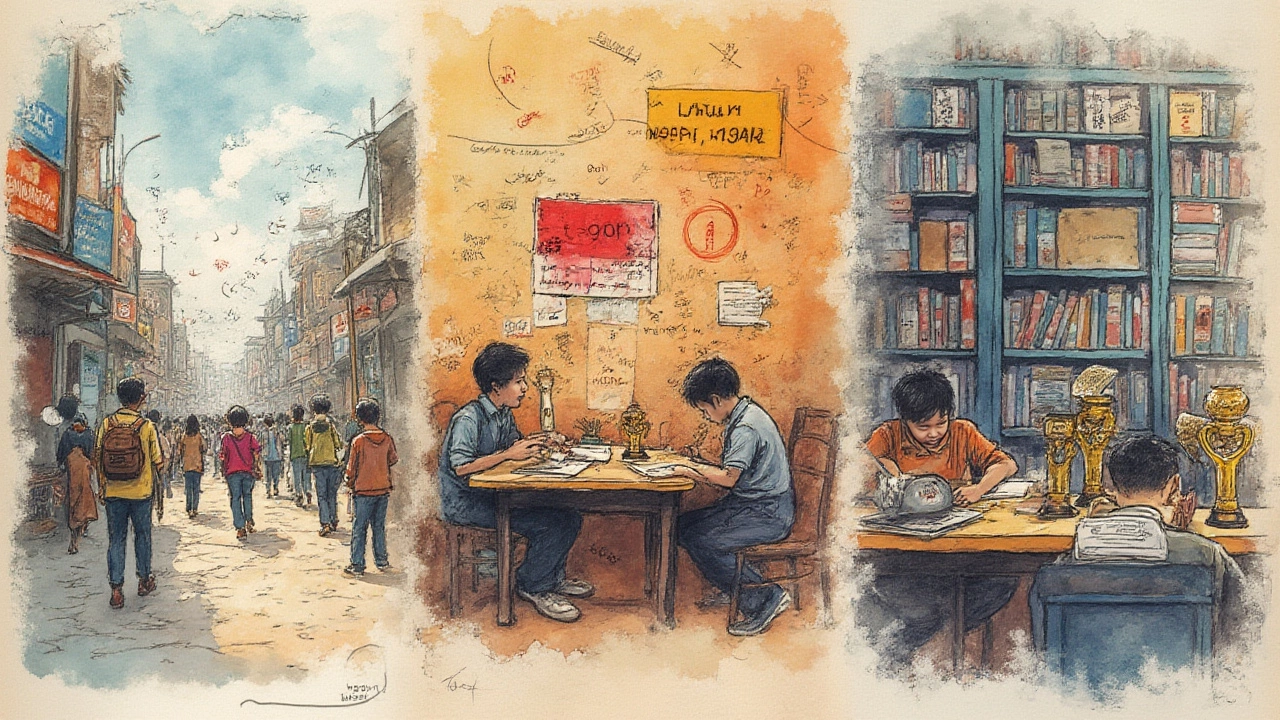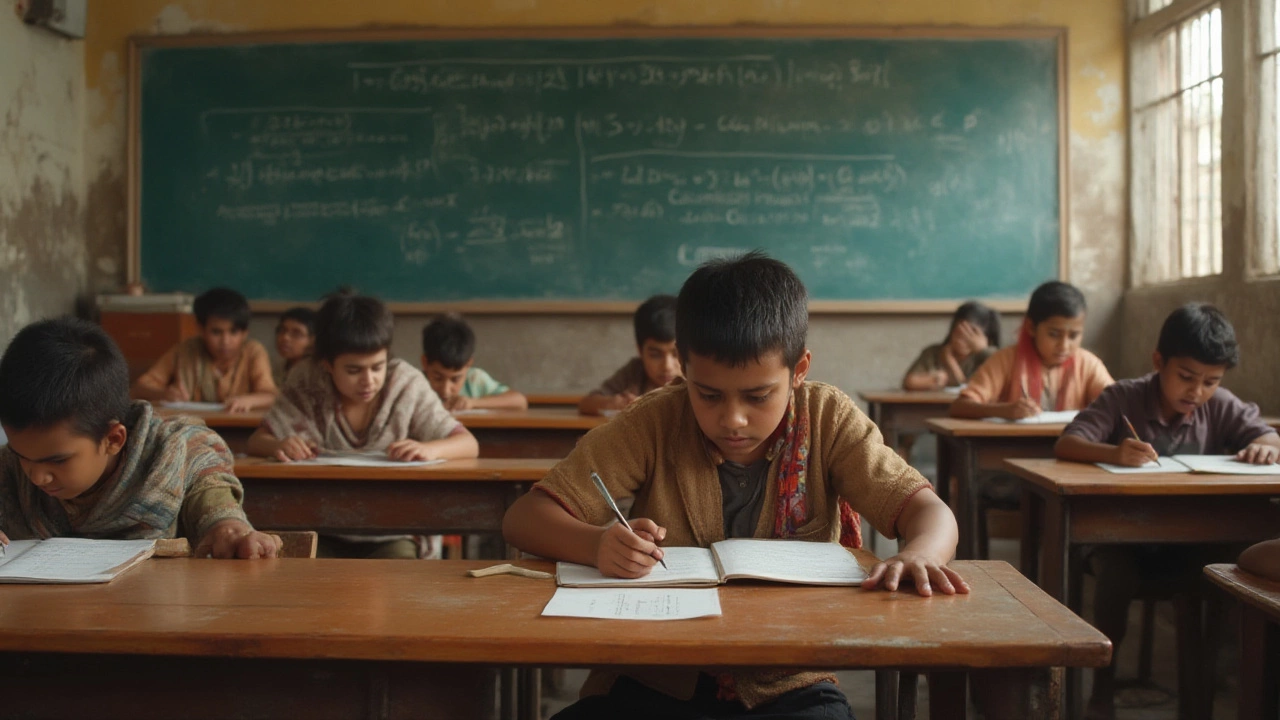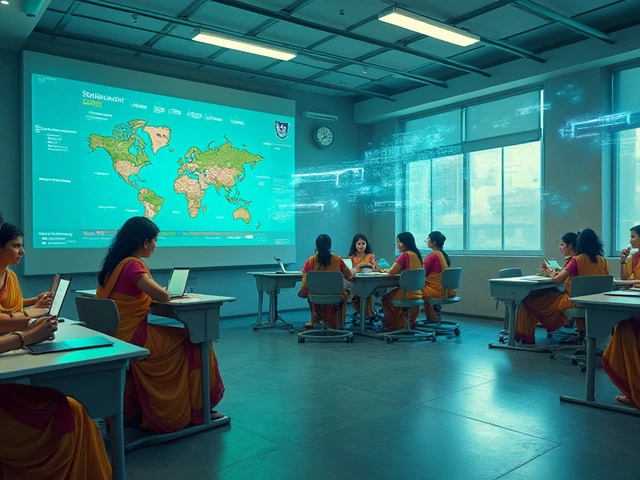If you've ever sat in a hot classroom staring at a math problem that feels like it was written in another language, you're not alone. It's no secret that math can make even the smartest kids sweat, but not all math is created equal. Just imagine: in some countries, what qualifies as tough could make students elsewhere weep—or yawn. The phrase 'hardest math in the world' gets tossed around all the time, but there’s more to it than just killer homework and brutal teachers. To find out which country really sets the gold standard—or maybe the torture rack—in mathematics, we need to peek inside classrooms, check out nationwide exams, and sift through international competitions where the best and brightest go head-to-head. Along the way, prepare to be surprised, maybe even a little bit shocked, by how different teaching styles, cultural attitudes, and national pride all come together to create a very different kind of math class.
The Global Math Showdown: Who Really Has the Toughest Syllabus?
Now, here’s the juicy bit—every country likes to think its curriculum is the hardest. But not all math classes are on the same level. Take Singapore. Their curriculum is the stuff of legend. Kids there start algebra while some of their international peers are still counting apples and oranges. On top of that, Singapore’s approach is deeply rooted in problem-solving, with word problems that feel more like puzzles you’d expect to find on a TV quiz show than in a worksheet. Teachers spend weeks hammering concepts with so many twists and turns that foreign students sometimes call their textbooks "nightmare fuel."
But they’re not alone. China, especially in major cities like Shanghai and Beijing, is notorious for moving fast and leaving no room for the faint-hearted. Chinese students tackle thick homework packets, attend after-school tutorials, and gear up for the GaoKao—the national university entrance exam that’s so competitive, the whole country holds its collective breath when results are released. The GaoKao isn’t just about passing—it's a life-defining moment, one that can decide your job prospects and sometimes even your marriage possibilities. The math section alone can stump even university students from other countries. And the volume of practice questions? Let’s just say Chinese printers stay busy.
Don’t forget about Russia. The Russian approach is heavy on logic and mathematical thinking. Students compete in math olympiads from a young age. Russian textbooks read like a training manual for international math competitions, and students in top schools go through problem sets that would send shivers down most kids’ spines. Some Russian high schools push students through hardcore topics like proof-writing, number theory, and mathematical induction years ahead of most Western curriculum timelines.
And then there's France. French math is famous for being, well, French—abstract, elegant, filled with a sense of pride for clarity and logic. Their "baccalauréat" (school leaving exam) pushes students through a long list of advanced topics, and it's not unheard of for high schoolers to stress over things like complex numbers and advanced calculus just to get into university. France also has a grand tradition of competitive exams for their "grandes écoles"—colleges that only accept students who can prove their math mettle at the highest level.
While the US tends to get flack for being middle-of-the-pack in international rankings, it’s not all easy going there. Advanced Placement (AP) Calculus or International Baccalaureate (IB) maths aren't for the faint-hearted. Some selective US schools push their keenest students into university-level math by age 16. But most kids outside the honors track deal with a relative walk in the park compared to the national standards of Asia or parts of Europe.
So, which country holds the bragging rights for the hardest math? It depends on who you ask and how you measure it. If by "hardest" you mean memorization, China and India will top the list. If it's about advanced problem-solving, Russia’s olympiad tradition leads the way. For conceptual depth and thoroughness, Singapore and France won’t be left far behind. Each country’s approach has advantages and downfalls, but one thing is certain: the definition of "hard" can shift a lot depending on where you're sitting.

International Math Competitions: Where Geniuses Go to Battle
If math class feels like a wrestling match, then international competitions are the World Cup. The International Mathematical Olympiad (IMO) sits at the top of the pile and is possibly the best lens we get into which country breeds the toughest mathematicians. This annual event corrals the sharpest high school minds from more than 100 countries and throws them six mammoth problems over two days—each so tricky they make adult mathematicians do a double-take.
Year after year, you’ll spot a pattern: China, the United States, Russia, South Korea, and a few other East European nations hog the top spots. China, especially, has a reputation—almost myth-like—for producing a conveyor belt of medal-winning mathletes. This isn’t an accident. China’s system grooms prodigies from primary school with fierce after-hours training camps. Contenders grind on obscure-theorem problems and speed through calculation drills that would make most adults quit. When you hear stories about kids solving university-level questions at age 13, you realize these are not your average classrooms.
Russia’s math olympiad culture is almost a sport of its own. Their local and national contests start with kids as young as 10, ramping up in difficulty straight through high school. Winning the Russian National Olympiad means instant academic street cred. Alumni from these contests often end up running top tech firms or doing groundbreaking research later on.
But don’t count out smaller nations. Take Hungary—its math olympiad traditions go back nearly a century. Hungary has produced more Fields Medalists—the “Nobel Prize” of math—per capita than almost any other nation. Their approach? Less memorization, more creative thinking, tons of open-ended puzzles, and an emphasis on mathematical beauty.
And here’s a curveball: countries like Iran and Vietnam have punched above their weight in the IMO several times. Vietnam, in particular, barely makes headlines for most subjects, but in math contests, they’re consistently in the top 10. The secret ingredient seems to be relentless focus, early screening for gifted kids, and national prestige for winners. Math whizzes in Vietnam get honored on TV as national treasures.
The International Mathematical Kangaroo deserves a shout-out too. Though aimed at a younger crowd, it reaches millions of kids worldwide and features quirky problem-based questions that favor reasoning over rote memorization. Top-performing countries often correspond with those doing well at the IMO—the math magic clearly starts young.
So, math competitions are more than nerdy bragging rights. They shape how countries think about tough problems, spark national investment in talent, and influence how schools teach regular kids, too. Even if you’re nowhere near making the olympiad squad, knowing what the best-of-the-best tackle can put your own math journey in perspective—and maybe inspire a little envy, or relief, too.

Culture, Mindset, and Tips: Cracking 'Hard Math' Wherever You Are
It’s tempting to chalk up math toughness to thick textbooks and never-ending problem sheets, but there’s more at play than just curriculum. Culture heavily colors how students, parents, and teachers attack math problems. Take Japan: math is an everyday habit for primary kids, and after-school "juku" (cram schools) drill standards into muscle memory. Failure isn’t stigmatized; it’s a stepping stone. Ask a Tokyo teenager what keeps them grinding, and it’s usually a mix of family pressure and national pride. For them, math’s a ladder to the best schools, the coolest jobs, and parental bragging rights at block parties.
Contrast that with Finland. Finnish students reliably rank high on international math scores, yet their approach is all about balance and well-being. Homework is shorter, class sizes small, and students get plenty of unstructured playtime. Teachers—often with master’s degrees in education—tailor lessons and spend more one-on-one time guiding students. There are high expectations, but less rigid competition. Finnish students grow up seeing math as a set of life skills, not just a win-or-die challenge.
The upshot: what counts as "hard" can mean different things. In some places, it means covering topics years earlier than your peers abroad. In others, it’s about problem-solving stamina, quick thinking, or sheer creativity.
If you want to beat tough math, what can help? Here’s what real students and coaches from these "hard math" countries recommend:
- hardest math country students keep a daily routine. Regular, bite-sized review keeps concepts from slipping away. Even 15 minutes a day takes you further than cramming before the test.
- Don’t just memorize, understand. Top math students focus on "why" and "how," not just the answer. Struggling on a hard problem? Step back and break it into smaller pieces.
- Try math competitions, even at the beginner level. They fire up your problem-solving instincts and put classroom theory to the test.
- Find study buddies. Two minds see things differently. Some of the toughest math wizards in Singapore and China study in groups and argue through why the answer works.
- Use mistakes as learning gold. In Japanese classrooms, teachers put wrong answers on the board for a group autopsy. The lesson? Every error is a clue about where your understanding slipped.
- Rest is underrated. Students in Finland and even top performers in France swear by balanced routines—enough sleep, brain breaks, and exercise to keep the mind fresh.
So, here’s the bottom line: The 'hardest math' isn’t just about the numbers on the page—it’s molded by culture, competition, and attitude. Whether you’re sweating in Shanghai or puzzling through calculus in Paris, what's "hard" is always relative. But peek into the world's toughest math classes and you’ll find one thing in common: it’s never the country, but the mindset and the method that separates the merely good from the truly great.






Write a comment: